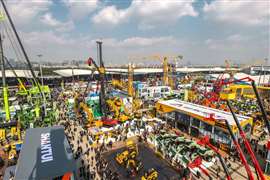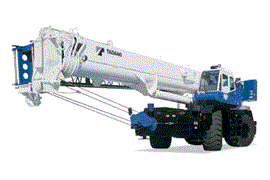Emma Crates talks to Trudi Nicholls of UK company Fork Rent
10 November 2011

At a time of widely reported financial doom and gloom, British family-owned company Fork Rent is ignoring the recession with major investment and expansion plans. Emma Crates reports.
Trudi Nicholls would love to show me her latest access acquisition, the compact tracked Niftylift TD120TN, but it's out at work already. "It arrived yesterday, and went out on site first thing this morning," says Ms Nicholls, "Things are a little bit crazy this week."
We're standing in the yard of Ipswich-based plant hire company Fork Rent where Ms Nicholls is managing director, a role she shares with her brother, Guy. A quick glance round Fork Rent's yard indicates that this is a company where nothing stands still for long.
To the front of the premises rows of JCB telescopic telehandlers, Hitachi excavators, mini dumpers and rollers gleam in the sunshine. The machines are clean and in some cases look like new. "Don't photograph those," says Ms Nicholls. "That's just our second hand kit for sale."
Talking to Trudi and Guy Nicholls it's hard to believe that the rental business had just faced one of the worst recessions in generations. Around the world many equipment rental managers may have been thinning out their fleets, but at the East Anglian-based company the mood is one of acquisition and expansion.
Further down the yard a new, larger, office is under construction; a massive order for telehandlers has been placed with JCB; and Guy Nicholls hints that Fork Rent is in negotiations to buy another company.
As no final agreement has been reached at the time of interview, Mr Nicholls is reluctant to name the company, or hint at where it might be based. But he does concede that, should Fork Rent be successful, it will be investing heavily in its new acquisition. "They've got in excess of 450 machines, and there's a huge amount of equipment that we‘d want to replace straight away," he says.
Given the current climate Mr Nicholls, who does much of the buying and selling at the firm, has a shopping list that could make a financial controller's eyes water.
In the last quarter of 2010, Fork Rent purchased more than 300 JCB telehandlers. In addition, more than 350 JCB telehandlers will be arriving in the first quarter of 2011.
Indeed, over the course of 2011, Fork Rent has placed an order with JCB for more than 1000 new machines. "And we'll probably have 40 Hitachi excavators in the first quarter. They'll be all sizes, ranging from 1.5 to 21 t," says Mr Nicholls.
You can tell that the brother and sister have worked closely together for a long time. "My brother and I can make decisions very easily and quickly. We can move very quickly if we see an opportunity and need," says Ms Nicholls.
"If we get an order in [for some machines], we buy them, simple as that," adds Mr Nicholls. "If one of us is in the office, we won't phone up the other one to ask if we can do it. We just get on with it. We both know what the other one's thinking anyway."
It was this kind of thinking that brought Fork Rent into access market three years ago. Following an increasing number of requests from regular customers, Fork Rent moved swiftly to build up a collection of articulating boom platforms, such as the Manitou 180 ATJ; Skyjack scissor lifts of varying sizes, and specialist tracked access equipment.
But access platforms are still a small part of the 2300-strong Fork Rent fleet. As the company name suggests, telehandlers still form the largest section, the most popular sizes are between 12 and 17 m reach. Fork Rent also has some specialist compact telehandlers, often hired by builders merchants and clients forced to work in areas where access is tight. The majority of the telehandler fleet is JCB, but there are a few Manitou units.
Excavators form the second largest part of the fleet, from the Hitachi EX8 micro excavator to the largest model, a Hitachi ZX210LC, or the reduced tailswing ZX225.
Other machines include a range of dumpers and mini dumpers that match up with the different excavator sizes, some rollers, specialist vehicle carriers and a few lorry loader cranes.
Fork Rent has bucked the trend on utilisation rates. While many plant hire bosses have had to sell equipment to keep utilisation rates up, the company's fleet has continued to expand, with older machines being routinely sold off to be replaced by newer models.
Even in the depths of the recession, in September 2010, the fleet's utilisation rate exceeded 90%, says the company. "At that time we had a lot of machines on order, but the lead times are very long," says Mr Nicholls. In early 2011 the average utilisation rates hover around a very respectable 85 per cent.
Certainly, company accounts filed by Fork Rent reveal that the company has indeed performed well through the recession. Revenues in the year to 31 March 2010 were £7.6 million, up 5.5% on the previous year, with net profits slightly down on the previous year but still healthy at almost £1 million.
So what is Fork Rent's secret to success?
Ms Nicholls stresses that she and the team have always worked very closely with customers to make sure the equipment meets their requirements. Keeping downtime to a minimum is top priority.
"We also tend to select the machines that have the highest specifications. If customers are requesting special features like sway, or turbo, or whatever is coming onto the market, we make sure we give it to them. We were one of the first companies to lead the way with air conditioning when manufacturers started offering it around eight years ago," she adds.
This strategy was successful in economic boom times, but Mr Nicholls believes that having higher specification machines has not necessarily helped to bolster up Fork Rent's rental prices in the recession.
"In the past couple of years is we've continued to work for less money. Equipment is getting more expensive, and hire rates continue to fall," says Mr Nicholls. "In the past having higher spec equipment has helped prices. I hope that that comes back, when common sense prevails."
Both he and his sister are reluctant to elaborate on the extent to which their prices have fallen. They say that the market dictates the movements, and individual costs vary widely, depending on the equipment itself and the requirements of the customer.
So how do they know that they're not over expanding? "We monitor everything very closely," says Ms Nicholls. "There's always potential for selling machines off in quiet times, but we haven't been doing too much of that recently, because of moving forward."
Unlike many other British companies, Fork Rent's expansion has not been hampered by lack of credit or ready cash. Mr Nicholls says Fork Rent has financed many of its plant deals itself, sometimes by selling off property owned by the company. At other times credit has not been hard to come by.
Both he and his sister remain upbeat about prospects, and critical of the media that seems intent on forecasting only doom and gloom in the economy, particularly in the construction sector.
"Housebuilders may not be building as many houses as they were, but they're still building. They still need to move equipment. Our machines are still on site, even if the number has reduced slightly."
As well as building and civil engineering clients, Fork Rent supplies machines to a variety of sectors, including maintenance, warehousing and distribution, demolition and agriculture. Mr Nicholls believes the waste sector could be a growing market in the future.
For a company that has only one depot in East Anglia, the machines travel a surprisingly long way: as far as the Isle of Wight in the south, or Scotland in the north. Over the years Fork Rent machines have turned up on prestigious projects such as the Millennium Dome, the Oval Cricket ground. Some are currently slaving away at the Olympic Park in London.
Over the years Mr Nicholls has watched large multinationals try to buy their way into the British market and with much satisfaction watched them withdraw again. "Companies like that, the big finance houses, try to set up one stop shops, with hire centres everywhere. They just don't care about their customers. It might work in the USA, but it doesn't work here.
"The most successful companies are people like us. We take a very personal approach to our customers, and we're hands on all the time. This is our life and this is what we do."
The phone rings, and Guy Nicholls is out of the door. There is barely time to say goodbye. The interview is over.
"You can bet there's a deal on the end of that phone call," says Ms Nicholls.
The Fork story
Fork Rent was founded in Ipswich 45 years ago by Percy Nicholls. He ran it alongside two other companies, Trucks R Us which sells new and used commercial vehicles and plant, and Redi Hire which rents out commercial vehicles.
Percy Nicholls' son and daughter, Guy and Trudi, ran the business alongside their father for years, and become joint managing directors following his death around 14 years ago.
While Guy has always worked in the business, Trudi joined the family firm in 1988 after a stint working as an interior designer in London.
"I said I'd try it out for a month and see how I got on. Twenty two years on I'm still here," she laughs."It was a steep learning curve at first, but my interest was held because every day was completely different. When I joined it was an exciting time as we were expanding."
Fork Rent is now the largest business in the group after a major expansion in the late 1980s and early 1990s.
"Our father gave us a lot of power to do things while he was still alive. So after his death we were able to carry on the business seamlessly. He'd given us a very good grounding," says Ms Nicholls who started out in the accounts department, and is now responsible for much of the office work.
"Dad had some really good principles which we still apply today. Pay your bills on time. Respect everybody. Look after your customers. The good old fashioned principles of life."



